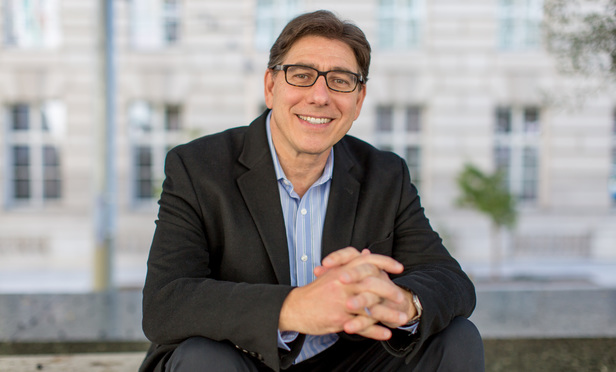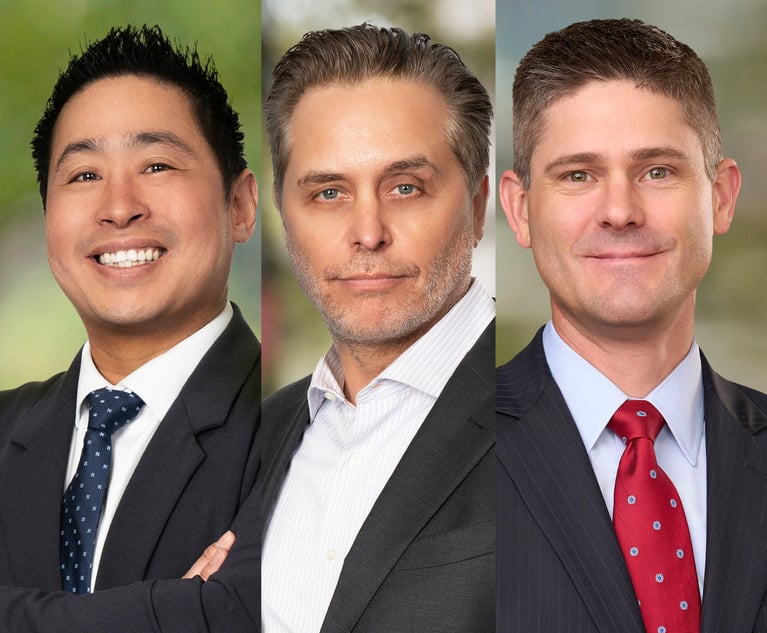With Anger and Confusion Swirling Over Bar Exam Topic Disclosure, Calif. Officials Vow to Investigate
"To have students distracted in this way, at this time, it's outrageous," said Stephen Ferruolo, dean of the University of San Diego School of Law.
July 29, 2019 at 12:56 AM
6 minute read
 (Photo: bibiphoto/Shutterstock.com)
(Photo: bibiphoto/Shutterstock.com)
California State Bar officials said Sunday they will launch an independent investigation into how the essay topics for this week's bar exam were disclosed to 16 law school deans Thursday.
One of those deans—bar officials declined to identify which one—alerted a bar staffer Saturday that a memo inviting law school executives to observe a future exam grading session also improperly disclosed six areas that will be covered by the test.
Bar officials say they have no indication the information was shared with anyone planning to take the exam. But Donna Hershkowitz, the bar's director of programs, said after consulting with a testing expert bar leaders decided to reveal those topics to the approximately 9,000 registered test-takers.
The bar's email arrived shortly after 9 p.m. Saturday, leading many recipients to initially question whether the message was a hoax or the result of a hacked email server. It was not.
“On behalf of the state bar, we do sincerely apologize for this error,” Jason Lee, president of the bar's board of trustees, said in an interview with The Recorder on Sunday. “Having taken the test myself 20 years ago, I understand the stress of preparing. This only adds to the level of the stress.”
The disclosure is the latest round of trouble for California's notoriously difficult bar exam. Critics have said the second-highest-in-the-nation passing score requirement hurts would-be lawyers whose scores would be good enough to ace other states' tests.
“To have students distracted in this way, at this time, it's outrageous,” said Stephen Ferruolo, dean of the University of San Diego School of Law.
Ferruolo, who is traveling on the East Coast, said he first learned about the disclosure and bar email to test-takers Sunday morning. Since then, he said, he and the school staff have been trying to reassure graduates—including some questioning why he did not disclose the topics himself—that they are prepared to take the test. Ferruolo was not one of the deans that received the bar memo with the test topics.
“It raises questions about California's ability to administer the bar exam,” the dean said. Ferruolo is advocating for the state Supreme Court to lower the exam's passing score and to adopt the Uniform Bar Exam, a multistate test that allows applicants to transfer their scores among participating states.
California bar leaders say the “inadvertent” release happened this way: A bar staffer drafted a memo asking law school deans if they were interested in attending a grading session for the July 2019 bar exam. The second page of the memo listed the six topics the exam would cover and asked deans to rank their preferences for attending the grading by topic.
Hershkowitz said such invitations are usually sent to deans after the exam concludes. But the staffer drafted the memo and an accompanying email early and sent it out Thursday, not realizing that the document improperly disclosed the topics, she said.
David Faigman, dean of UC-Hastings College of the Law, said he learned about the bar's disclosure Saturday night. He was watching a movie at home when his daughter, a recent graduate of UC-Berkeley School of Law, came into the room and showed him the bar's email she had just received.
 David Faigman, University of California, Hastings College of the Law. (Photo: Jason Doiy/ALM)
David Faigman, University of California, Hastings College of the Law. (Photo: Jason Doiy/ALM)Faigman said his first thought was that the email was a hoax; he had received nothing himself from the bar. Later, he said, Hershkowitz returned a message confirming that the news was indeed real. His message to Hastings grads was to stay focused.
“The last thing they need is to have their world turned upside down by the bar exam,” he said.
Faigman was actually one of the deans to receive the email Thursday. He said he saw the email, but didn't read the memo, and passed it on the school's academic dean, who passed it to an associate dean. That executive saw the topics and, while puzzled about their disclosure, assumed the information was confidential and did not share it with anyone, Faigman said.
Faigman said he and other deans are now asking for a meeting with the bar and the California Supreme Court to find out more about what happened and how it can be prevented from happening again.
In a statement released Sunday night, bar leaders said they considered changing the topics on the exam and even postponing the test. But the bar does not have authority to change the date of the Multistate Bar Exam, and it would take too long to prepare and print new test questions, they said. A postponement would harm those test-takers who were traveling long distances, including international applicants, officials said.
On social media, current and former exam-takers criticized the bar's actions.
“I can't see how this is fair to everyone taking the bar exam on any other test date,” tweeted @keitheyoung, who identifies himself as an attorney from Ohio. “Giving out the information as to the topics is a HUGE advantage, and anyone participating in a past or future test should be up in arms.”
Hershkowitz said graders for the July 2019 exam will be instructed not to score the tests any more harshly or differently because of the early topic disclosure.
Asked if the test results for this week's exam should be viewed in the future with an asterisk, Lee said “absolutely not,” citing “the lengths we have gone through and will continue to go through to make sure this test is viewed like any other we've administered.”
Read more:
California Bar 'Inadvertently' Reveals Essay Topics Days Before Exam
How Law Schools Fared on California's February 2019 Bar Exam
Nearly 7 in 10 Flunked California's February 2019 Bar Exam
This content has been archived. It is available through our partners, LexisNexis® and Bloomberg Law.
To view this content, please continue to their sites.
Not a Lexis Subscriber?
Subscribe Now
Not a Bloomberg Law Subscriber?
Subscribe Now
NOT FOR REPRINT
© 2025 ALM Global, LLC, All Rights Reserved. Request academic re-use from www.copyright.com. All other uses, submit a request to [email protected]. For more information visit Asset & Logo Licensing.
You Might Like
View All

How We Won It: Latham Secures Back-to-Back ITC Patent Wins for California Companies
6 minute read
California Court Denies Apple's Motion to Strike Allegations in Gender Bias Class Action

White & Case KOs Claims Against Voltage LLC in Solar Companies' Trade Dispute
Trending Stories
- 1New York Judge Steps Down After Conviction for Intoxicated Driving
- 2Keys to Maximizing Efficiency (and Vibes) When Navigating International Trade Compliance Crosschecks
- 3Houston Law Firm Files $250K Breach of Contract Suit Against 2 Former Lawyers
- 4The Week in Data Feb. 3: A Look at Legal Industry Trends by the Numbers
- 5Mass Tort Cases: Challenges for Plaintiff’s and Defense Counsel
Who Got The Work
J. Brugh Lower of Gibbons has entered an appearance for industrial equipment supplier Devco Corporation in a pending trademark infringement lawsuit. The suit, accusing the defendant of selling knock-off Graco products, was filed Dec. 18 in New Jersey District Court by Rivkin Radler on behalf of Graco Inc. and Graco Minnesota. The case, assigned to U.S. District Judge Zahid N. Quraishi, is 3:24-cv-11294, Graco Inc. et al v. Devco Corporation.
Who Got The Work
Rebecca Maller-Stein and Kent A. Yalowitz of Arnold & Porter Kaye Scholer have entered their appearances for Hanaco Venture Capital and its executives, Lior Prosor and David Frankel, in a pending securities lawsuit. The action, filed on Dec. 24 in New York Southern District Court by Zell, Aron & Co. on behalf of Goldeneye Advisors, accuses the defendants of negligently and fraudulently managing the plaintiff's $1 million investment. The case, assigned to U.S. District Judge Vernon S. Broderick, is 1:24-cv-09918, Goldeneye Advisors, LLC v. Hanaco Venture Capital, Ltd. et al.
Who Got The Work
Attorneys from A&O Shearman has stepped in as defense counsel for Toronto-Dominion Bank and other defendants in a pending securities class action. The suit, filed Dec. 11 in New York Southern District Court by Bleichmar Fonti & Auld, accuses the defendants of concealing the bank's 'pervasive' deficiencies in regards to its compliance with the Bank Secrecy Act and the quality of its anti-money laundering controls. The case, assigned to U.S. District Judge Arun Subramanian, is 1:24-cv-09445, Gonzalez v. The Toronto-Dominion Bank et al.
Who Got The Work
Crown Castle International, a Pennsylvania company providing shared communications infrastructure, has turned to Luke D. Wolf of Gordon Rees Scully Mansukhani to fend off a pending breach-of-contract lawsuit. The court action, filed Nov. 25 in Michigan Eastern District Court by Hooper Hathaway PC on behalf of The Town Residences LLC, accuses Crown Castle of failing to transfer approximately $30,000 in utility payments from T-Mobile in breach of a roof-top lease and assignment agreement. The case, assigned to U.S. District Judge Susan K. Declercq, is 2:24-cv-13131, The Town Residences LLC v. T-Mobile US, Inc. et al.
Who Got The Work
Wilfred P. Coronato and Daniel M. Schwartz of McCarter & English have stepped in as defense counsel to Electrolux Home Products Inc. in a pending product liability lawsuit. The court action, filed Nov. 26 in New York Eastern District Court by Poulos Lopiccolo PC and Nagel Rice LLP on behalf of David Stern, alleges that the defendant's refrigerators’ drawers and shelving repeatedly break and fall apart within months after purchase. The case, assigned to U.S. District Judge Joan M. Azrack, is 2:24-cv-08204, Stern v. Electrolux Home Products, Inc.
Featured Firms
Law Offices of Gary Martin Hays & Associates, P.C.
(470) 294-1674
Law Offices of Mark E. Salomone
(857) 444-6468
Smith & Hassler
(713) 739-1250






